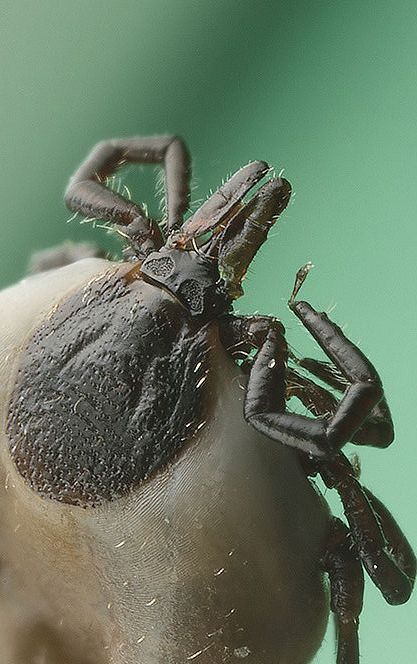Difference between revisions of "Category:Ticks"
| (9 intermediate revisions by 2 users not shown) | |||
| Line 1: | Line 1: | ||
| − | + | {{frontpage | |
| − | + | |pagetitle =Ticks | |
| + | |pagebody = | ||
| + | Ticks (Suborder: Metastigmata) are temporary ectoparasites which live by haematophagy on the blood of mammals, birds and sometimes reptiles and amphibians. Ticks are of considerable veterinary importance, particularly in warmer climates where they can cause substantial economic losses through decreased productivity and most importantly by disease transmission. They are also important in human medicine as they cause [http://en.wikipedia.org/wiki/Lyme_disease Lyme Disease] (borreliosis) and [http://en.wikipedia.org/wiki/Tick-borne_meningoencephalitis tick-borne encephalitis/meningoencephalitis]. | ||
| + | Ticks decrease productivity by causing fleece and hide damage, preventing animals from feeding (tick worry), ascending motor paralysis and anaemia. Infestation can also lead to secondary infection from [[Myiasis Producing Flies|blowfly]] and [[Screw Worm|screw worms]] leading to [[Blowfly Strike|strike]]. | ||
| + | The soft ticks are only of importance in warmer climates, whereas the hard ticks cause significant problems in both warmer and temperate climates. | ||
| + | |contenttitle =Content | ||
| + | |contentbody =<big><b> | ||
| + | <br><br> | ||
| + | <categorytree mode=pages>Ticks</categorytree> | ||
| + | </b></big> | ||
| + | |logo =Tick logo.jpg | ||
| + | }} | ||
[[Category:Arachnida]] | [[Category:Arachnida]] | ||
Latest revision as of 12:54, 29 November 2010
Ticks (Suborder: Metastigmata) are temporary ectoparasites which live by haematophagy on the blood of mammals, birds and sometimes reptiles and amphibians. Ticks are of considerable veterinary importance, particularly in warmer climates where they can cause substantial economic losses through decreased productivity and most importantly by disease transmission. They are also important in human medicine as they cause Lyme Disease (borreliosis) and tick-borne encephalitis/meningoencephalitis.
Ticks decrease productivity by causing fleece and hide damage, preventing animals from feeding (tick worry), ascending motor paralysis and anaemia. Infestation can also lead to secondary infection from blowfly and screw worms leading to strike.
The soft ticks are only of importance in warmer climates, whereas the hard ticks cause significant problems in both warmer and temperate climates.Subcategories
This category has the following 3 subcategories, out of 3 total.
Pages in category "Ticks"
The following 5 pages are in this category, out of 5 total.
